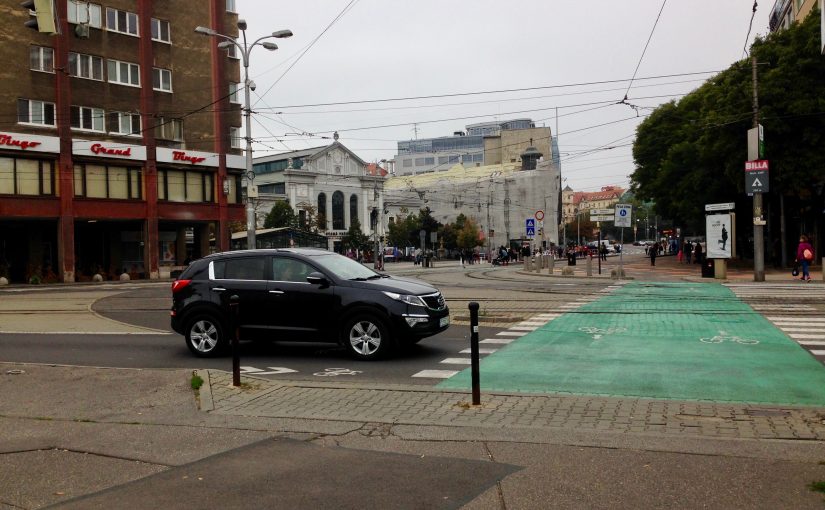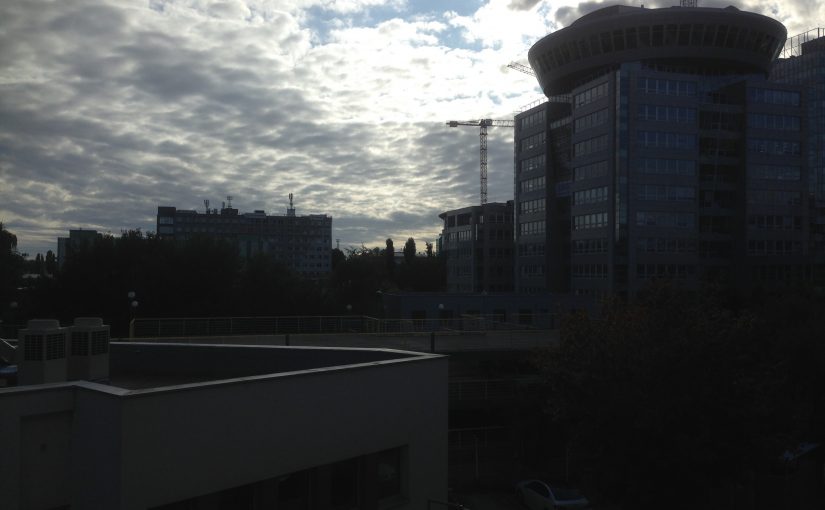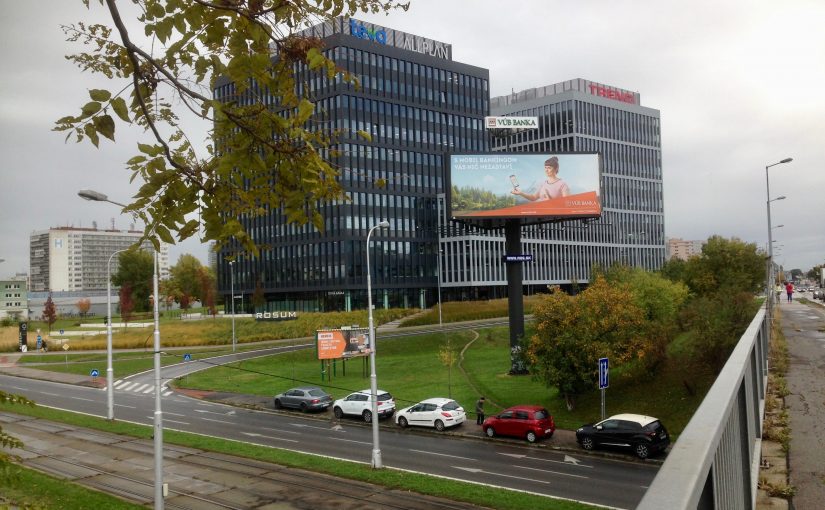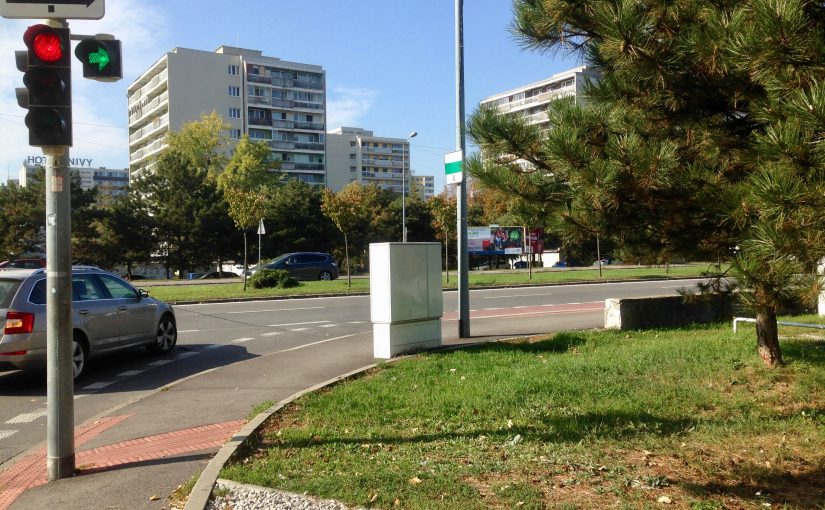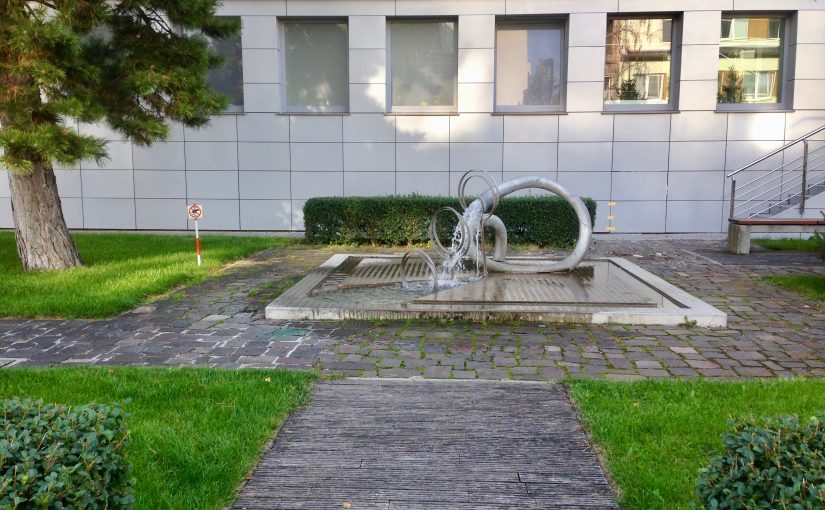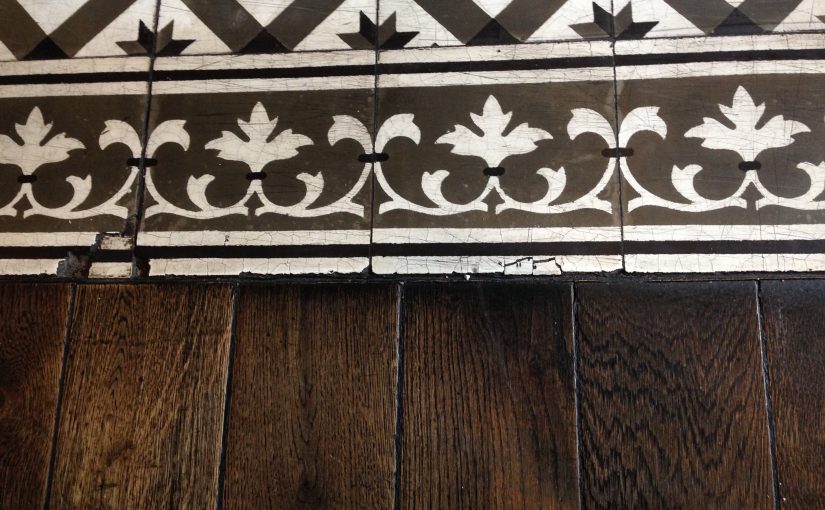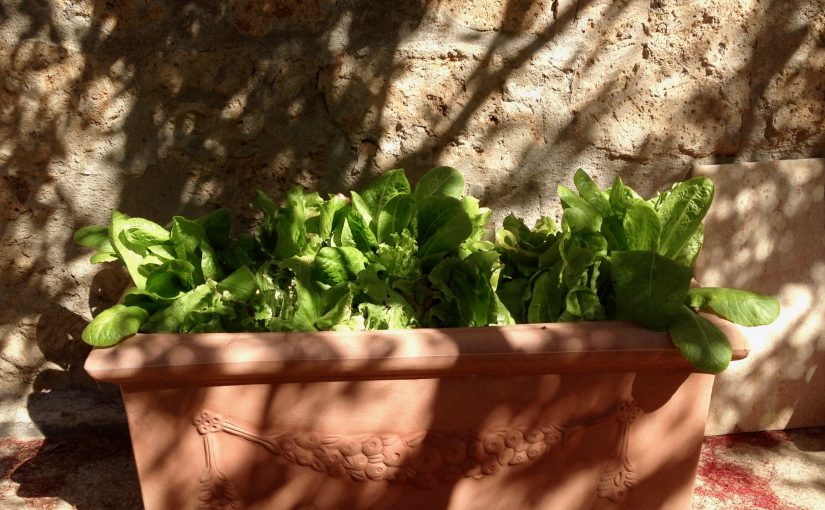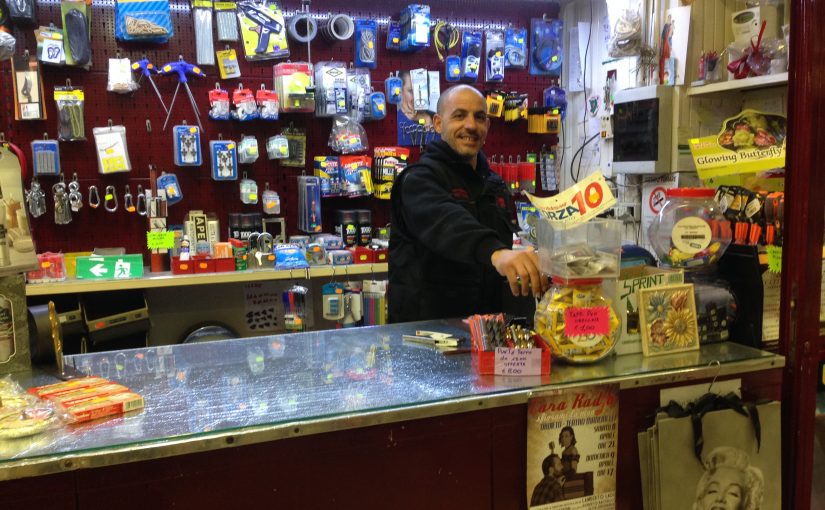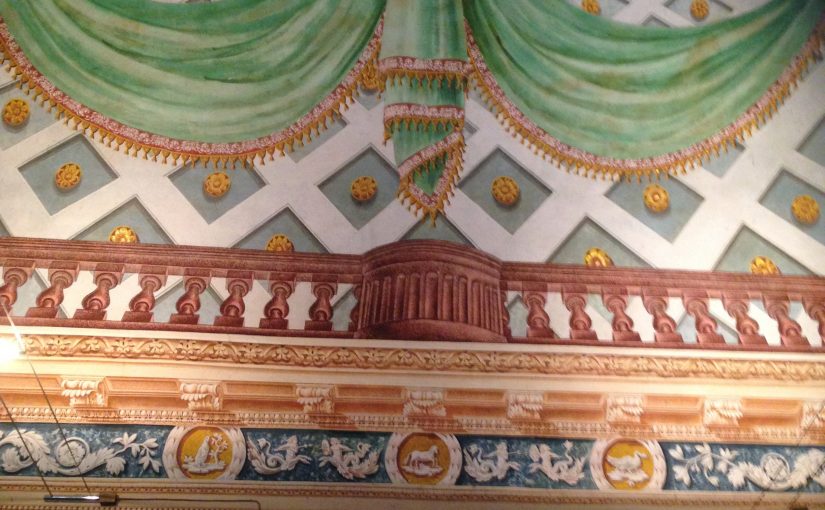In planning this trip, I ended up exhausted by the amount of research required, and convinced that I had made a dozen serious errors. On Sunday, my first full day here, the apartment seemed to be awkwardly located off to one side of a Business Center that had a number of restaurants offering lunch on weekdays, and nothing much of anything else. While the walk to the clinic seemed doable, I couldn’t grasp traipsing it every day. There didn’t seem to be anything local by way of normal services – at all. Of course, five days later I’ve discovered a lot. In fact, apartment, location, services, are – for my current purposes – all perfect. And the apartment I found in Vienna for next weekend, which I somehow thought was 10 kilometers from the center, is 5 minutes by subway. It is also easily reached from places in Bratislava I already know, so next Friday’s “move” won’t be difficult either.
All that is colored by one overriding factor, of course; that Ivanna’s assessment of how things will progress is accurate.
You may have noticed that I have been in search of a metaphor for this process. Metaphors are useful in that they can provide a familiar context for something totally unfamiliar. But they are not predictors. I can’t choose a model and expect it to apply next time I look. Ivanna said, un-metaphorically, that during the first 5 to 8 days, symptoms may vacillate between more pronounced and almost gone, and with a higher contrast between extremes even than those usually exhibited by PD. I have to embrace that, and all observations need to be nested in that reality.
So, for example, my right arm was not trembling yesterday except when I lay on my right side. It swung liberally and in tune to my gait while walking. Today, after Nap One, it trembled in a number of positions, except when I lay on my right side, and was looser in general but the lovely near-strut of yesterday was absent. Since lunch it has been quiet again.
This morning, all of the muscle-clenching symptoms were essentially gone. This afternoon they are back, albeit at a less clenched level.
However. I got out of bed today without have to strategize how to accomplish it, and it occurred so naturally that I was halfway to the bathroom before I realized what had happened. And. A bit later I was able to get up from this sofa – as low and as soft as a good love song – without the effort turning into a circus act. I was likewise in the kitchen before it hit me how easy it had been.
On the other hand, I’ve felt what I call “goofy” all day. It has been the case for months that between breakfast and my morning walk, I feel the goofiest, but this morning’s goof was the most pronounced I remember it ever being, and the walk did not fully resolve it.
So, the pattern is?
Years ago I saw an aerial photo in Life Magazine of a five-point Boson intersection during rush hour. The picture was cropped so we could not see where the cars were coming from or going to, but among the 100 or so pictured, no two of them were pointed in the same direction. In one of these posts, I suggested a Boston rush hour as a possible metaphor. If I decide to choose one, I think that will be it.
I told Ivanna about the gettings up this morning. She was thrilled.
– That you’re having such a good sign, so early, even if it doesn’t repeat for a few days, it is wonderful.
– And yesterday that dark sample wiped me out.
– It what?
– Laid me flat. Smacked me down.
– I’m sorry?
– Made me very, very tired.
– Also a good sign. Your body is being receptive to this, is working hard. Be good to it, rest.
A couple of weeks ago, Janette advised me by email not to plan touristic things during treatments. Perhaps what she meant to say was – it will be impossible to do anything but eat, sleep, and bathe, so don’t even think about it.
I asked Ivanna this morning how samples are chosen each day. Well, it’s simple. The clinic they order from sends packages. So for instance, a ten-implant package for nervous system disorders, a five-day package for digestive problems, etc. She just opens the next one in line, and by patient report has formed theories, such as noticing that the very dark samples tend to engender stronger responses. Yesterday’s was cioccolato molto fondente. Today, the well-used leather of a man’s belt. Yesterday’s knocked me out. Today; so far pretty powerful, too. I’ve napped for a total of three hours since noon, and it’s only five o’clock.
The weekend is off. I’m hoping to get into Old Town, and hoping I feel up to it. If I do, I’ll tell you all about it. If not, I’ll tell you about “My Bratislava”. Not quite as exciting, but just in case you never make it here, yourself.
* * *
TRAPIANTO CINQUE (di dieci) – La metafora
Nel pianificare questo viaggio, alla fine ero stancatissimo dalla quantità di ricerche e convinto di aver commesso una dozzina di errori gravi. Domenica, il mio primo giorno intero qui, l’appartamento sembrava essere situato in una posizione scomoda a fianco di un Business Center che aveva alcuni ristoranti che offrivano il pranzo nei giorni feriali e nient’altro. Mentre la passeggiata per la clinica sembrava fattibile, non potevo afferrarla ogni giorno. Sembrava che non ci fosse nulla di locale a livello di negozi normali – affatto. Ma, cinque giorni dopo ho scoperto molto. In effetti, appartamento, posizione, negozi, sono – per i miei scopi attuali – tutto perfetto. E l’appartamento che ho trovato a Vienna per il prossimo fine settimana, che in qualche modo pensavo fosse a 10 chilometri dal centro, è a 5 minuti di metropolitana. È anche facilmente raggiungibile da luoghi a Bratislava che già conosco, quindi anche la traslocazione di venerdì prossimo non sarà difficile.
Tutto ciò che è colorato da un fattore prevalente, ovviamente; che la valutazione di Ivanna su come andranno il percorso dei trattamenti è accurata.
Potresti aver notato che sono stato alla ricerca di una metafora per questo processo. Le metafore sono utili in quanto possono fornire un contesto familiare a qualcosa di totalmente sconosciuto. Ma non sono profetiche. Non riesco a scegliere un modello e mi aspetto che venga applicato la prossima volta che guardo. Ivanna ha detto, non metaforicamente, che durante i primi 5-8 giorni, i sintomi possono vacillare tra più notevoli e quasi scomparsi, e con un contrasto più elevato tra gli estremi anche di quanto sia normalmente mostrato dal PD. Devo abbracciarlo e tutte le osservazioni devono essere bassati in quella realtà.
Quindi, per esempio, ieri il mio braccio destro non tremava, tranne quando mi stendevo sulla destra. Oscillava liberamente e in sintonia con la mia andatura mentre camminavo. Oggi, dopo Pisolino Uno, ha tremato in diverse posizioni, tranne quando mi sono sdraiato sulla mia destra, ed è stato più libero in generale, ma il bel puntone di ieri era assente nella camminata di oggi. Da pranzo è stato di nuovo tranquillo.
Questa mattina, tutti i sintomi di contrazione dei muscoli erano praticamente spariti. Oggi pomeriggio sono tornati, anche se ad un livello meno stretto.
Però. Oggi mi sono alzato dal letto senza dover pianificare le strategie per realizzarlo, ed è accaduto così naturalmente che ero a metà strada del bagno prima di rendermi conto di quello che era successo. E. Poco dopo sono stato in grado di alzarmi da questo divano – basso e morbido come una buona canzone d’amore – senza lo sforzo di trasformarmi in un atto circense. Ero anche in cucina prima che mi colpisse quanto fosse stato facile.
D’altra parte, ho sentito quello che chiamo “goffo ” tutto il giorno. È stato per mesi il caso che tra la colazione e la mia passeggiata mattutina mi senta il più goffo, ma il goffo di questa mattina è stato il più pronunciato che io abbia mai ricordato, e la camminata non l’ha risolto del tutto.
Quindi, lo schema è?
Anni fa ho visto una foto aero in Life Magazine di un incrocio delle cinque strade durante l’ora di punta a Boston. L’immagine è stata ritagliata in modo da non poter vedere da dove venissero o arrivassero le macchine, ma tra le circa 100 nella foto, nessuna di esse era puntata nella stessa direzione. In uno di questi post ho citato l’ora di punta di Boston come possibile metafora. Se decido di accontentarmene, penso che sarà così.
Ho detto a Ivanna come sono alzarmi stamattina. Era elettrizzata.
– Che tu abbia un buon segno, così presto, anche se non si ripete per alcuni giorni, è meraviglioso.
– E ieri quel campione oscuro mi ha spazzato via.
– E cosa?
– Mi ha lasciato piatto. Mi ha colpito.
– Mi dispiace?
– Mi ha fatto molto, molto stanco.
– Anche un buon segno. Il tuo organismo è ricettivo a questo, sta lavorando sodo. Sii buono, riposa.
Un paio di settimane fa, Janette mi ha avvisato via e-mail di non pianificare cose turistiche durante i trattamenti. Forse quello che intendeva dire era : sarà impossibile fare altro che mangiare, dormire e fare il bagno, quindi non ci pensare nemmeno.
Stamattina ho chiesto a Ivanna come vengono scelti i campioni ogni giorno. Bene, è semplice. La clinica da cui ordinano invia pacchi. Quindi, ad esempio, un pacchetto di dieci impianti per disturbi del sistema nervoso, un pacchetto di cinque giorni per problemi digestivi, ecc. Apre solo il successivo nella coda e, secondo la relazione del paziente, ha formulato teorie, come notare che i campioni molto scuri tendono a generare risposte più forti. Ieri è stato cioccolato molto fondente. Oggi, la pelle ben usata della cintura di un uomo. Ieri mi ha messo fuori combattimento. Oggi, finora, anche abbastanza potente. Ho riposato per un totale di tre ore da mezzogiorno, e sono solo le cinque.
Al fine settimana sono libero. Spero di entrare nel centro storico e spero di sentirmi all’altezza. Se lo faccio, ti racconterò tutto. In caso contrario, ti parlerò di “My Bratislava”. Non altrettanto entusiasmante, ma nel caso in cui non lo fai mai qui, tu stesso.
